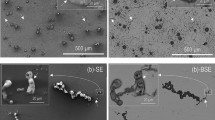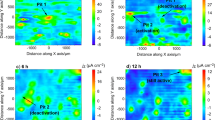Abstract
IN some experiments reported recently by Moreau and Chaudron1, it was found that prolonged immersion of high-purity aluminium in dilute (N/100) caustic soda solution resulted in the absorption of large quantities of hydrogen by the metal, and that the presence of this gas had a measurable effect upon the elastic modulus. After 20– 30 days immersion, the hydrogen content, measured by an ion-bombardment extraction method, was found to be as high as 1,000 c.c. per 100 gm. of metal. This measurement was carried out on specimens turned down from the original corroded blocks, and the results would, therefore, indicate that the absorbed hydrogen had penetrated to a considerable depth in the metal.
This is a preview of subscription content, access via your institution
Access options
Subscribe to this journal
Receive 51 print issues and online access
$199.00 per year
only $3.90 per issue
Buy this article
- Purchase on Springer Link
- Instant access to full article PDF
Prices may be subject to local taxes which are calculated during checkout
Similar content being viewed by others
References
Moreau and Chaudron, C. R. Acad. Sci, Paris, 219, 554 (1944).
Goldowski, A.S.T.M.-A.I.M.E. Symposium on Stress-Corrosion Cracking of Metals, 372 (1944).
Eborall and Ransley, J. Inst. Metals, 71, 525 (1945).
Author information
Authors and Affiliations
Rights and permissions
About this article
Cite this article
RANSLEY, C., NEUFELD, H. Absorption of Hydrogen by Aluminium Attacked in Caustic Soda Solution. Nature 159, 709–710 (1947). https://doi.org/10.1038/159709a0
Issue Date:
DOI: https://doi.org/10.1038/159709a0
Comments
By submitting a comment you agree to abide by our Terms and Community Guidelines. If you find something abusive or that does not comply with our terms or guidelines please flag it as inappropriate.



